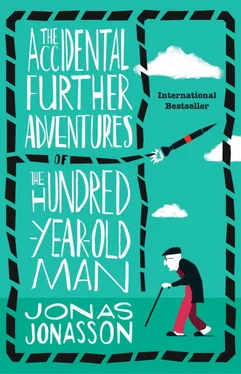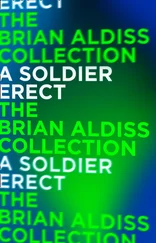No, the least troublesome option would probably be to find out the reason for the flare.
‘Shame on you, sailor!’ said Captain Pak Chong-un. ‘Representatives of the Democratic People’s Republic of Korea don’t leave those in distress in the lurch. Set a new course and prepare for a rescue action. That’s an order!’
The first mate gave a frightened salute and hurried off. He cursed himself for not doing a better job of watching his tongue. If the captain reported this, his career would be over. At best.
* * *
By now the water was up to the ankles of the friends in the basket on the sea. Allan sat with his black tablet, marvelling that it worked in the middle of nowhere. ‘Listen to this!’ he said.
And he told his friend that it wasn’t only presidents who made fools of themselves out in the world, like Robert Mugabe of Zimbabwe, for example, the man who had defined homosexuality as ‘un-African’ and decided that it ought to be worth ten years in prison so the homosexual would learn. Recently Mugabe’s wife had allegedly used an extension cord to attack a girl who had spent time with the couple’s son at a hotel room. Apparently in that family they had issues with heterosexuality as well.
Julius was too distressed to have any opinion on his friend’s latest news and was just about to ask him to be quiet, so he could sit there and die in peace, when he was interrupted by a horn. In the distance he and Allan could make out a ship. Heading straight for the basket.
‘Isn’t that the damnedest thing?’ said Julius. ‘You’re going to survive this too, Allan.’
‘And so are you, it seems,’ said Allan.
* * *
The only items that accompanied the two old men onto the ship were Allan’s black tablet and the last bottle of champagne. Allan was holding the tablet in one hand and the champagne in the other as he and Julius met Captain Pak on the foredeck.
‘Good day, Captain,’ he said, once each in English, Russian, Mandarin and Spanish.
‘Good day,’ the astonished captain responded in English.
He had command of both Russian and Mandarin and, thanks to his many excursions to and from Cuba, he knew a certain amount of Spanish, but he was the only one of the crew who spoke English, and he felt instinctively that the fewer ears that listened and understood the better. At least until this mysterious situation cleared up.
Captain Pak informed the two castaways that their lives had just been saved in the name of the Democratic People’s Republic of Korea and for the glory of the Supreme Leader.
‘Say hello and thanks to the Supreme One, if you run into each other from now on,’ said Allan. ‘Where might we be let off along the way? Indonesia would be great, if it’s not too much trouble. We didn’t bring any identification papers, and it’s always a little tricky to change countries, isn’t it?’
Yes, Captain Pak knew how tricky it could be to change countries. It wasn’t the sort of thing you did with ease where he came from. But that wasn’t enough reason to fraternize with foreign gentlemen plucked from a bucket on the open sea. And certainly not in front of the crew, no matter the language.
‘As commanding officer, I am bound by law to guard the cargo of this ship carefully during our journey, as well as watch out for the cargo owners’ interests more generally. According to the same law, I am duty-bound to conduct the ship with due promptness.’
‘What does that mean?’ Julius asked nervously.
‘It means what I just said,’ said Captain Pak.
‘It means he’s not going to let us off before Pyongyang,’ said Allan.
Julius had no desire to see North Korea. ‘But please, dear Captain,’ he said. ‘We happen to have a bottle of champagne here. We thought it might come in handy if we were picked up as we now have been. It’s not quite as well chilled as it ought to be, but if the captain doesn’t mind that, we’d be happy to share it. We can get to know each other and see what sorts of solutions might be hiding just around the corner.’
That was well put, Allan thought, holding up the bottle in support.
The captain took it from his hand and informed them that it was being confiscated as no alcohol was allowed on board.
‘No alcohol?’ said Julius.
No alcohol? Allan thought, on the verge of asking to return to the basket.
‘You gentlemen will be interrogated for information in two hours. For the time being you are not under suspicion of any crime, but that can always change. I intend to conduct the interrogation myself. The first two questions will be, who are you and why did you elect to float around in a woven basket on the open sea? With a bottle of champagne. But we’ll deal with that then.’
Captain Pak turned to his first mate, who was told he must take his belongings and move down with the crew, since he had just been relieved of his officer’s cabin. He should instead have the two foreign men installed there. Furthermore, the first mate should make sure a sailor stood watch outside the cabin, unless he chose to guard it himself, to make sure the two gentlemen didn’t come to any harm or, for that matter, get up to causing any harm.
The first mate gave a salute. He wasn’t happy about this development. Forced to associate with the crew for the sake of two aged whites… No, the captain should have left them at sea. This could only end as poorly as it had begun.
Captain Pak Chong-un sensed trouble brewing. Once again he checked the contents within the otherwise securely locked door to the safe in the captain’s quarters. He kept the key on a chain around his neck.
The safe contained all the mandatory ship’s logs, a copy of maritime law, and a briefcase full of four kilos of lead-shielded, enriched uranium.
The task he had personally been delegated by the Supreme Leader was now only three days from completion. There were no clouds on the horizon of this task. In a literal sense, that was. Which meant, as always, that the American satellites were keeping a watchful eye on him. That was a cloud in and of itself, albeit a metaphorical one. Another was the two foreign men in the first mate’s cabin just on the other side of the wall.
Captain Pak allowed himself to sum up the situation before walking the few steps to the neighbouring cabin. ‘Ugh.’ He stared at the watchman until said watchman realized he should open the door for his captain. And then he stared again until the watchman closed the same door.
‘Gentlemen, it is time to be interrogated,’ said Captain Pak Chong-un.
‘Lovely,’ said Allan.
Congo is the second-largest country in Africa and has always been rich in two particular things: natural resources and misery.
The most miserable period of all was when King Leopold II of Belgium used the country as his private rubber farm. He enslaved everyone he encountered and had upwards of ten million people killed. That’s an entire Sweden. Or an entire Belgium, if you prefer.
When Congo gained independence many difficult years later, a certain Joseph Mobutu ended up in the president’s chair. He became most famous for selling his country’s resources to the highest under-the-table bidder, keeping the money for himself, and changing his name to ‘the All-powerful Warrior who, because of his endurance and inflexible will to win, goes from conquest to conquest, leaving fire in his wake’.
This guy, thought the United States, was the future of Congo and Africa. And, with the kind aid of the CIA, the All-powerful Warrior remained in power for several decades. Uranium succeeded rubber as the most interesting natural resource. Indeed, the USA received the uranium for the atomic bombs over Hiroshima and Nagasaki from Congo and, as thanks for the help, assisted in the installation of a Congolese nuclear research facility under the leadership of the all-powerful one who left fire in his wake. It’s possible that this was not the United States’ brightest political decision in history.
Читать дальше
Конец ознакомительного отрывка
Купить книгу












